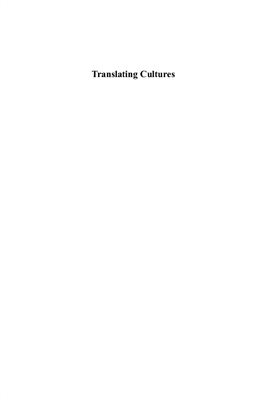Translating Cultures: Perspectives on Translation and
Anthropology.
Publisher: Berg Publishers.
Publication date: 2003.
Number of pages: 320.
Format / Quality: pdf.
Many of us are not aware of translation in our everyday lives. However, the way we talk, write, read, and interpret are all part of a translation process, and the ability to translate experiences and thoughts is a major issue for those living outside their native cultures.
The task of the anthropologist is to take ideas from one culture and translate them first into another language, and then into the language of anthropology. The process raises crucial questions. Can we, for example, unravel the true meaning of the Christian doctrine of trinity when there have been so many translations? What impact do colonial and postcolonial power structures have on our understanding of other cultures? And how can we use art as a means of transgressing the limitations of linguistic translation?
This book is the first to fully engage with such questions. It is essential reading for anyone interested in anthropology, philosophy, linguistics, history, and cultural theory.
Publisher: Berg Publishers.
Publication date: 2003.
Number of pages: 320.
Format / Quality: pdf.
Many of us are not aware of translation in our everyday lives. However, the way we talk, write, read, and interpret are all part of a translation process, and the ability to translate experiences and thoughts is a major issue for those living outside their native cultures.
The task of the anthropologist is to take ideas from one culture and translate them first into another language, and then into the language of anthropology. The process raises crucial questions. Can we, for example, unravel the true meaning of the Christian doctrine of trinity when there have been so many translations? What impact do colonial and postcolonial power structures have on our understanding of other cultures? And how can we use art as a means of transgressing the limitations of linguistic translation?
This book is the first to fully engage with such questions. It is essential reading for anyone interested in anthropology, philosophy, linguistics, history, and cultural theory.

